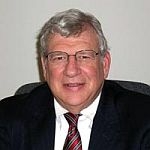
(Host) A Vermonter is taking a leading role in shaping national energy policy.
David Coen is a member of the state Public Service Board, the panel that oversees utilities.
This year, Coen also leads a national association of utility commissioners. And that group is an influential voice for the states as Congress and the White House shape climate change legislation.
VPR’s John Dillon reports:
(Dillon) Back in 1995, Governor Howard Dean named a Vergennes businessman to the state Public Service Board. Ever since David Coen has served on the three-person panel that acts as a judge in cases that touch everyone’s lives. The board sets utility rates and oversees telecommunications policy.
It’s an important job, but one done outside public view. Members make their views known only through legal rulings and by the occasionally sharp question during a rate case.
This year, Coen has taken on a more prominent role. He leads the National Association of Regulatory Utility Commissioners, known as NARUC.
(Coen) "I’d like to try to think I bring a Vermont focus. We have a special state here and those who have said Vermont can lead the nation, and I believe we do, certainly in energy efficiency policy and environmental policy, and I try to bring that perspective as well."
(Dillon) The organization represents regulators from around the country. Coen will be in Sacramento this weekend for the association’s summer meeting. On the agenda are discussions about the role of states in setting national climate policy.
(Coen) "The reality is that with the vacuum that Congress has created by not having legislation, state regulators have jumped into that and have set up renewable energy portfolios, they’ve set up other things in terms of their decisions and have tried to steer their states and therefore the country to a more carbon-free environment."
(Dillon) NARUC has urged Congress to give states the freedom to pursue local efforts and not pre-empt them with national climate legislation.
Coen has also pushed back against a federal plan to build huge power lines to carry electricity from wind projects out west to population centers in the East. The Obama administration wants to expand federal authority over where the lines can go. But Coen worries about the cost to consumers, and the loss of state control.
(Coen) "There’s no more difficult decision that I do as a regulator in Vermont than making decisions about putting transmission lines in people’s backyards and front yards. It’s not a pretty thing. And I don’t like doing it. But I also feel that I and my fellow board members have a better idea of our population and of Vermonters than certainly the federal government does."
(Dillon) This is the first time in its 122-year history that a Vermonter has led the association. And Coen has put the state’s environmental focus on the group’s work.
(Sedano) "David Coen has paid attention to trying to advance the climate change discussion within NARUC. He’s been very nurturing about that."
(Dillon) Rich Sedano is a former public service commissioner who now works for the Regulatory Assistance Project, a non profit based in Montpelier. He says utility commissioners are influential in Washington because they have a consumer focus.
(Sedano) "The fact that they have accountability to the public as opposed to private interests, gives them a particular role in this conversation."
(Dillon) Sedano says Coen has also invited high-profile Vermonters to speak at NARUC meetings.
This weekend in Sacramento, for example, Green Mountain Power President Mary Powell will talk about why she believes large-scale hydroelectric power should be considered a renewable resource.
For VPR News, I’m John Dillon in Montpelier.